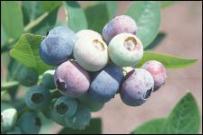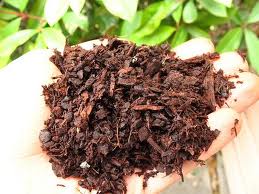Question: We live in Tampa and would like to grow blueberries in containers. What are some varieties recommended for our area?
Great question!
Now is a perfect time to plant blueberries in Florida. It is easy to grow blueberries in containers and is typically much better than growing them in the ground. Blueberries thrive in a low pH soil. The recommended growing media for containerized blueberries is pine bark fines. You don’t need to plant them in additional soil as they will grow and perform best when planted directly in the pine bark.
Because pine bark is naturally acidic, this is the best media to use. Blueberries require a soil pH of 4.0-5.5. A relationship exists between soil pH and the nutrients available to plants. If your soil pH is higher or lower than the recommended range, you may encounter nutrient deficiencies that lead to poor growth and establishment. Please contact our office if you need information about soil testing to measure pH: http://hillsborough.ifas.ufl.edu/residential_lg/diagnostics.shtml
Since most fruit needs high chilling requirements, proper cultivar selection of low-chill cultivars is important because Florida’s brief and mild winters do not provide periods of high chill. Two types of blueberries that grow well in Florida are rabbiteye Vaccinium virgatum and southern highbush- which includes the hybrids Vaccinium darrowii, Vaccinium virgatum and Vaccinium corymbosum. Southern highbush blueberries are adapted to the Tampa Bay area, as they grow well in areas south of Ocala and north of Sebring. Southern highbush is also recommended for container production.
The best time to plant blueberries is from mid-December to mid-February. Most blueberry cultivars require cross-pollination from another cultivar of the same type to set fruit, so you will need to plant multiple blueberry plants of the same cultivar. You can increase fruit set of your blueberries by encouraging beneficial insects (bees, wasps) and minimizing pesticide use or timing pesticide use when pollinators are less active.
To help you choose which cultivar you prefer (based on yield, taste considerations, ripening periods, etc.) and for information about recommended fertilizer application, irrigation, pruning, pests, and diseases, please visit this link and download the UF/IFAS pdf Blueberry Gardener’s Guide:http://edis.ifas.ufl.edu/mg359
Growing several cultivars will lengthen your harvest season. Be sure to protect your blueberries from freezes and bird damage. Because blueberries are susceptible to Phytophthora root rot, do not plant them deeper than the pot. You can set them a little higher than the soil level.
Additional reference:
Blueberry Varieties for Florida: http://edis.ifas.ufl.edu/hs215
Good luck!
Nicole Pinson
Extension Agent – Urban Horticulture
Master Gardener Coordinator
UF/IFAS Hillsborough County Extension Service
5339 County Road 579
Seffner, FL 33584-3334
p: (813) 744-5519 X 54145
nicolepinson@ufl.edu
pinsonn@hillsboroughcounty.org
http://hillsborough.ifas.ufl.edu







